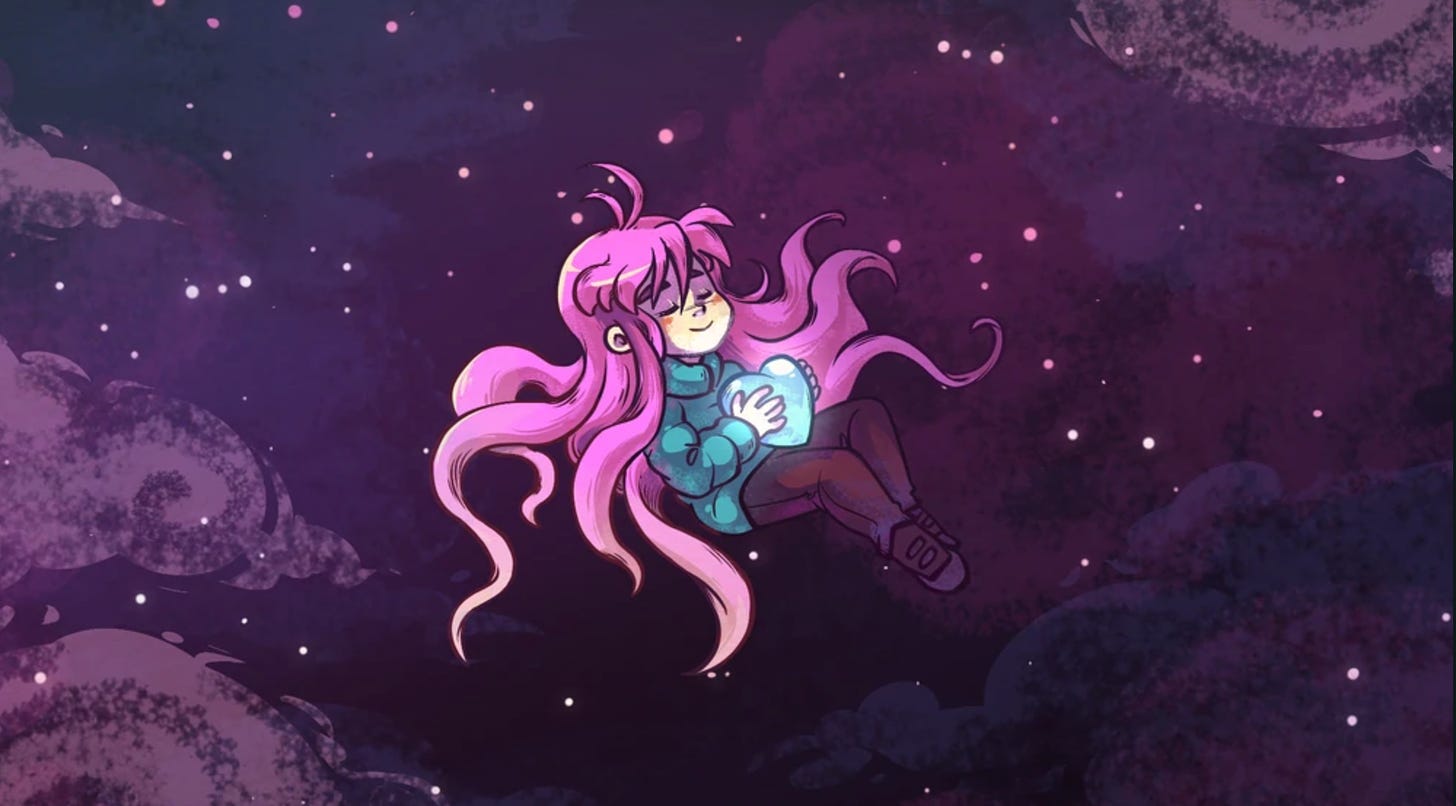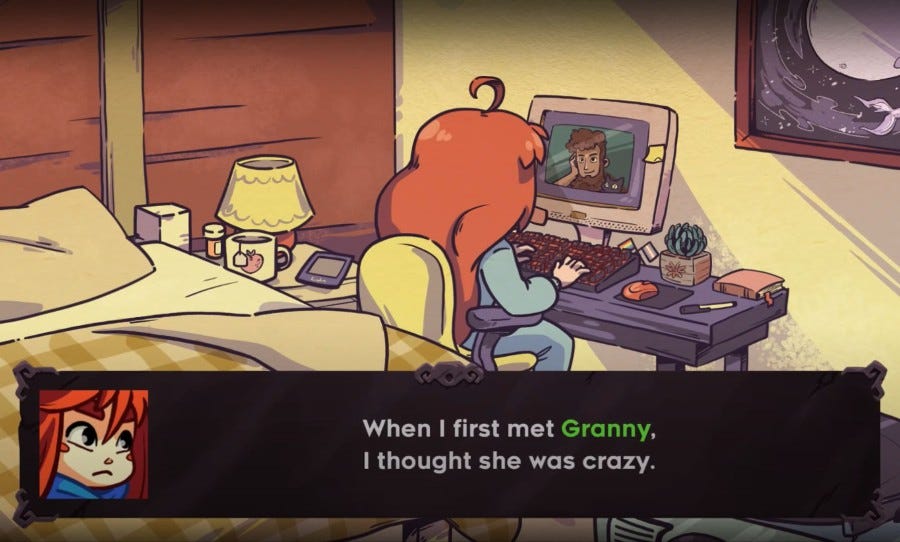Celeste’s Farewell DLC confirmed Madeline’s identity as a transgender woman, and everything changed a little. That’s hyperbole of course, but it’s how I felt when I saw someone post the picture from the end of Farewell, which to this day I still haven’t been able to beat despite many, many, tries.
This isn’t quite a review or analysis of Celeste itself, it’s more a contemplation of this series of events. Could the Farewell DLC be considered the game’s coming out? Is it an acknowledgement of the queer audience that Celeste amassed, and is it saying that yes, this is an LGBT game? I’m not sure. Celeste itself is written with a broad array of experiences in mind in regards to mental health in particular; the details of Madeline’s depression and anxiety are kept vague, and her coping mechanisms are varied. For anyone who has struggled with mental health, there will be something that lands for them within the game’s writing. The two tiny pride flags shown at the end of the Farewell DLC are one of the only moments where we are shown something direct and concrete about Madeline’s life. The flags are not only a representation of queerness but also a step away from the writing philosophy of the base game, a step towards specificity rather than catch-all depictions of strife. This is not to say that one method is better than the other, it is only to point out that there is a marked change here, even within this one small moment.
I keep going back to this moment in Celeste not only because it was a source of joy for me at the time it happened, but because of its placement within the narrative. Chronologically, it takes place at the end of the story, but critically after the story as well. Even in the base game, the credits don’t roll after the last level, but after the narrative climax. After what would end any other visual medium, the Core was waiting. This allows Celeste to subtly avoid the pitfall of the difference between storytelling convention and the reality of mental health. Stories end with everything neatly tied up, mental health does not. The Core itself seems to be a manifestation of the nonlinear path to recovery, with its two primary gimmicks being to limit Madeline’s double dash, an ability she gains when reconciling with “Badeline,” or her Other Me, and the frequent switching of the environment from hot to cold. Though there is very little text in this stage, the visual and ludonarrative cues depict Madeline having a bad mental health day. The rapidly changing climate depicts mood swings, and many of the platforms crumble under Madeline’s feet or launch her wildly through the air. Her inability to use her double dash to its full capacity shows somewhat of a mental block, she has lost the previous freedom of movement she had while climbing to the summit. At the end of the Core, she reaches an entirely serene and still state, where she has made peace with her mental health entirely. Is this the end?
No. If the Core depicted a bad day, Farewell is a relapse. Its status as DLC is interesting when analyzing the order of events of Celeste’s story, at least from a meta standpoint. It is definitively the game’s end, as you cannot complete Farewell without getting all of the hidden crystal hearts and completing the B sides and C sides. It requires playing and replaying Celeste’s toughest challenges to access the full narrative, and while the game’s assist mode doesn’t bar you from any of this, it is still a brutal endeavor to take part of. To be honest I probably should just bite the bullet and turn on assist mode so I can actually play the rest of Farewell, since I’m nowhere good enough at the game to beat most of the B sides, and don’t have enough time to be able to practice enough to get better. But at the same time I do know what happens, Madeline struggles to accept Granny’s death, relapses, simply shown by Badeline separating from her and removing the ability to double dash, then through her struggle against her grief she realizes that she can’t bring someone back from the dead. She calls Theo, there’s tiny pride flags on her desk, and they reconcile over their shared grief. So even though I haven’t experienced the story through toiling away at my controller, I’ve still been able to absorb it through recordings of the efforts of others. My experience with the narrative is different than people who have finished Farewell, but it’s not invalid.
But that still isn’t the end. There is still another massive layer of replaying that I haven’t mentioned up to this point. The golden strawberries, which you can earn by playing through a stage without dying at all, exist, and in Farewell, when attempting to get a golden strawberry, there is an extra challenge added to the end, adding an even more extreme layer of endless replay. Obviously, only the most dedicated of players, which I am admitting right now isn’t me, at least not for Celeste, will do this. But it’s still another thing left undone, the ideal 100% Celeste save file that only a small percentage of the game’s audience will ever have.
With the advent of medical transition beginning late last century, and the increasing visibility of transgender people in general, there is now a lot of discourse around the idea of gender transition. In the eyes of a (mostly) cisgender majority, transition is complete when a transgender person “passes.” So often I see photos that transgender people have taken years ago of their pre transition selves juxtaposed with their current appearance, and there’s nothing wrong with doing this obviously, but in general media there is little acknowledgement for transgender people in the “in between” state, and especially not for people whose transitions aren’t neccesarily male-to-female or female-to-male. It’s difficult to have an end goal in mind when my gender is a mystery to me most of the time, I really call myself a nonbinary man as a compromise with whatever the hell is going on in my brain. There’s no point in my life where a game would place a title screen, and the only appropiate place to put the credits I think is just whenever I end up dead eventually. When a transgender person passes, their life goes on, and when I am able to pass in some weird sense, my life will still go on.
In regards to socially transitioning, I’ve got one foot in the closet and one foot out. My family will not be reading this essay, but I’ll be sending it out to friends, internet people, and maybe one of my professors if I end up feeling extra smart. I haven’t done much to look more masculine, partly because I live in a pretty conservative area and partly because I don’t really like traditionally masculine dress that much. I am not on testosterone, and though I hope I will be within this year, there’s no gurantee that will be possible for a variety of reasons. If you saw me on the street, you would not think that I’ve begun my transition, and to be honest I don’t think I ever began a transition or will begin one. There’s no distinct starting point like there is in a game, and I think trying to figure out the exact point a person’s transition begins would become gatekeepy fast. And there’s no end to transition either, in many ways of thinking about it. Once I start testosterone, I will likely have to take it either for the rest of my life or whenever I decide to stop it at some point. If that happened I don’t think it’d be due to a detransition, I’ve known at some level that I was trans since I was around fourteen, it’d probably be me wanting to be more feminine or androgynous for whatever reason without completely abandoning being a man. Or a health reason, or for safety. Maybe a retransition at most.
I’ve reached a point with Celeste where I’ve put it down pretty much permanantly. I hit my personal skill ceiling for the game and I’m okay with that, even if I haven’t completed the game by everyone’s standards. I could decide to go back to it someday, but I don’t think I will due to wanting to play a lot of other games in the face of my ever-shrinking amounts of free time. But I’m taking this time to think about Celeste itself, and wondering if showing those tiny pride flags the game transitioned itself in a way. Madeline went from a fairly blank slate character (you can name her whatever you want. Ironically I started the game so long ago that her name is my dead name on my most completed file) to being canonically queer. But because Celeste is complete, and will likely not be receiving any updates beyond basic upkeep stuff, does that mean its transition is complete? Personally I don’t think so.
The reason for this is simple. The culture around Celeste, the fan created mods, the massive speedrunning community, the people still remixing Celeste’s music to this day, the fanartists, the fact that I’m writing this essay years after its release and years after the first time I saw the credits roll, and there are most likely other people doing the same in different ways. The official twitter account for Celeste still posts things every once in a while too. People are going to be talking about this game for years to come, and I don’t think the game will end until nobody cares about it anymore. So Celeste’s transition isn’t complete, as despite its “coming out” life moves on, and the Celeste community is still here.




